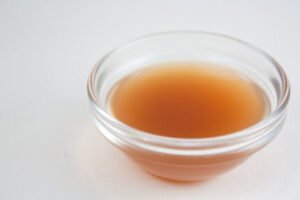Medically reviewed by Dr. Ramesh Gaddam, M.D. — Written by Sumalatha, D.N.H.E
Apple cider vinegar (ACV) has gained popularity for its potential health benefits, ranging from improved digestion to enhanced skin health.
Made from fermented apple juice, ACV contains acetic acid and various nutrients.
Historically used in traditional medicine and cooking, modern research has begun to explore its scientific merits.
This article delves into the evidence-based benefits of ACV, traditional uses, and safety precautions, providing a comprehensive guide for those interested in incorporating this versatile remedy into their daily lives.
1. Nutrition
Nutritional profile of apple cider vinegar (ACV) per 15 ml:
| Nutrient | Amount per 1 tablespoon (15 ml) | Health Benefits |
|---|---|---|
| Calories | 3 | Low-calorie addition to diets |
| Acetic Acid | Varies (~5-6%) | May aid in digestion and blood sugar control |
| Water | 94% | Hydration |
| Potassium | 11 mg | Supports heart and muscle function |
| Magnesium | Trace amounts | Essential for bone health and energy production |
| Calcium | 1 mg | Supports bone health |
| Phosphorus | 1 mg | Important for energy production and bone health |
| Iron | 0.1 mg | Essential for blood health |
| Manganese | Trace amounts | Antioxidant properties |
| Polyphenols | Varies | Antioxidant properties |
| Pectin | Trace amounts | May aid in digestion |
2. Scientific Evidence of Health Benefits
1. Digestive Health

Role of ACV in Improving Digestion
Apple cider vinegar (ACV) is believed to aid digestion by increasing stomach acidity, which can help break down food more efficiently.
This improved digestion can lead to better nutrient absorption and overall gut health.
Studies on ACV’s Impact on Gut Microbiota
Recent research suggests that ACV may positively influence gut microbiota, the community of beneficial bacteria in the digestive system.
These bacteria play a crucial role in digestion, immune function, and overall health.
ACV’s acidic nature can help balance the pH levels in the stomach, creating an environment conducive to the growth of beneficial bacteria.
Potential Benefits for Acid Reflux and Heartburn
ACV is often touted as a natural remedy for acid reflux and heartburn. Some believe that ACV can help balance stomach pH and improve digestion, reducing the likelihood of acid reflux.
However, scientific evidence supporting this claim is limited, and individuals with these conditions should consult healthcare professionals before using ACV as a treatment.
2. Blood Sugar Control

Research on ACV’s Effects on Blood Sugar Levels
Several studies have explored the effects of ACV on blood sugar levels.
Research indicates that ACV can improve insulin sensitivity, particularly after meals, which helps regulate blood sugar levels.
One study found that consuming ACV before a high-carbohydrate meal resulted in significantly lower blood sugar levels compared to a placebo.
Mechanisms of Action (e.g., Delaying Gastric Emptying)
ACV may help control blood sugar levels by delaying gastric emptying, the rate at which food leaves the stomach and enters the intestines.
This slower rate of digestion can prevent blood sugar spikes after meals, providing a more gradual release of glucose into the bloodstream.
Benefits for People with Type 2 Diabetes and Prediabetes
For individuals with type 2 diabetes and prediabetes, ACV may offer additional benefits by improving insulin sensitivity and lowering post-meal blood glucose levels.
However, it is essential to use ACV as part of a broader management plan that includes diet, exercise, and medication as prescribed by a healthcare provider.
3. Weight Management

Evidence from Studies on ACV’s Role in Appetite Suppression
Research has shown that ACV may help with weight management by promoting feelings of fullness and reducing overall calorie intake.
In one study, participants who consumed ACV with a high-carb meal ate fewer calories throughout the day compared to those who did not.
Impact on Metabolism and Fat Storage
ACV may also influence metabolism and fat storage. Some studies suggest that ACV can increase fat burning and reduce fat storage, although the effects are generally modest.
The acetic acid in ACV is thought to play a role in these metabolic processes.
Realistic Expectations and Limitations
While ACV may aid weight management, it is not a magic solution for weight loss.
Its effects are likely to be modest and should be complemented by a healthy diet and regular exercise.
Overreliance on ACV without other lifestyle changes is unlikely to produce significant weight loss.
4. Heart Health

Potential Effects on Cholesterol and Triglycerides
Some studies have investigated ACV’s impact on cholesterol and triglyceride levels.
Findings suggest that ACV may help lower total cholesterol, LDL (bad) cholesterol, and triglycerides while increasing HDL (good) cholesterol.
However, more research is needed to confirm these effects and understand the underlying mechanisms.
ACV’s Role in Managing Blood Pressure
ACV has been suggested to help lower blood pressure, potentially due to its potassium content and other beneficial compounds.
Potassium can help balance sodium levels in the body, contributing to lower blood pressure.
However, scientific evidence supporting this claim is limited, and ACV should not replace prescribed blood pressure medications.
Summarizing Relevant Scientific Findings
While preliminary research indicates potential cardiovascular benefits of ACV, it is essential to consider these findings in the context of a comprehensive heart-healthy lifestyle.
Regular exercise, a balanced diet, and medical advice are critical components of heart health.
5. Antimicrobial Properties

ACV’s Effectiveness Against Bacteria and Fungi
ACV has long been used for its antimicrobial properties, particularly its effectiveness against certain bacteria and fungi.
The acetic acid in ACV can inhibit the growth of harmful microbes, making it useful for food preservation and as a natural disinfectant.
Use in Food Preservation and as a Natural Disinfectant
ACV’s antimicrobial properties make it a valuable tool in food preservation, helping to extend the shelf life of various foods by preventing bacterial growth.
Additionally, ACV can be used as a natural household cleaner and disinfectant, offering a non-toxic alternative to commercial cleaning products.
3. Anecdotal and Traditional Uses
1. Skin Health

ACV in Treating Acne and Improving Skin Texture
Apple cider vinegar (ACV) is commonly used in traditional and anecdotal skincare routines for treating acne and improving skin texture.
Its antibacterial and antifungal properties are believed to help reduce acne-causing bacteria, and its acidic nature can help restore the skin’s natural pH balance.
Many users report that applying diluted ACV to the skin helps clear up acne, reduce inflammation, and smooth out skin texture.
Precautions and Proper Dilution for Topical Use
While ACV can be beneficial for the skin, it is essential to use it correctly to avoid irritation or burns.
ACV should always be diluted with water before applying it to the skin, typically in a 1:3 ratio (one part ACV to three parts water).
It’s recommended to perform a patch test on a small area of skin before widespread use to ensure there is no adverse reaction.
Users should avoid applying ACV to broken or sensitive skin and consult a dermatologist if they have any concerns.
2. Hair Care

Benefits for Scalp Health and Hair Shine
ACV is also popular in hair care for its potential benefits to scalp health and hair shine.
It is believed to help remove product buildup, balance the scalp’s pH, and enhance hair’s natural luster.
ACV’s antimicrobial properties may also help combat dandruff and other scalp conditions.
Methods of Incorporating ACV into Hair Care Routines
To use ACV in hair care, many people create a rinse by mixing 1-2 tablespoons of ACV with a cup of water.
This rinse can be applied after shampooing, left on for a few minutes, and then rinsed out with water. Some users add a few drops of essential oils for added benefits and a more pleasant scent.
Regular use of an ACV rinse can help maintain scalp health and promote shiny, smooth hair.
3. Detoxification and Cleansing
Traditional Beliefs and Modern Interpretations
ACV has been used for centuries in various cultures as a natural detoxifier and cleanser.
Traditionally, it is believed to help cleanse the liver, improve digestion, and eliminate toxins from the body.
These detoxification benefits are often attributed to the vitamins, minerals, and enzymes present in ACV.
Evidence Supporting Detox Claims
While many people swear by ACV’s detoxifying properties, scientific evidence supporting these claims is limited.
Some studies suggest that ACV may aid in digestion and support liver health, but more research is needed to confirm its detoxification benefits.
As with any detox regimen, it is crucial to maintain a balanced diet, stay hydrated, and consult with healthcare professionals to ensure safety and effectiveness.
4. Safety and Precautions
Potential Side Effects

Risks of Overconsumption
While apple cider vinegar (ACV) offers various health benefits, excessive consumption can lead to several side effects.
One of the primary risks is tooth enamel erosion due to its high acidity, which can weaken the enamel and lead to tooth sensitivity and decay.
Additionally, overconsumption of ACV can cause digestive issues such as stomach upset, nausea, and delayed stomach emptying, which might worsen conditions like gastroparesis.
Interaction with Medications
ACV can interact with certain medications, potentially altering their effectiveness or leading to adverse effects.
For example, ACV may lower potassium levels in the body, which can interact negatively with diuretics and other medications that affect potassium.
It can also affect blood sugar levels, which is a crucial consideration for people taking insulin or other diabetes medications.
Therefore, it is essential to consult with a healthcare provider before incorporating ACV into your routine if you are on any medications.
5. Proper Usage and Dosage
Recommended Amounts for Internal and External Use
For internal use, a common recommendation is to consume 1-2 tablespoons of ACV diluted in a large glass of water per day.
It can be taken before meals to help with digestion or as part of a morning routine.
For external use, particularly for skin and hair care, it is crucial to dilute ACV properly. A typical dilution ratio is 1 part ACV to 3 parts water for topical applications.
Importance of Dilution and Correct Application Methods
Diluting ACV is vital to prevent irritation and damage. For internal use, always mix ACV with water to reduce its acidity and protect the esophagus and stomach lining.
For external use, especially on the skin and hair, ensure proper dilution to avoid burns and irritation.
Conduct a patch test before applying ACV to larger skin areas to check for any adverse reactions.
6. Consulting Healthcare Professionals
Before incorporating ACV into your health regimen, especially in significant amounts, it is crucial to seek medical advice.
A healthcare professional can provide personalized recommendations based on your health status and medical history.
This is particularly important for individuals with chronic health conditions or those taking medications that may interact with ACV.
7. Who Should Avoid ACV?
Certain individuals should avoid using ACV due to its potential risks.
These include people with low potassium levels, those with a history of digestive issues such as ulcers or acid reflux, and individuals with chronic kidney disease.
Pregnant and breastfeeding women should also consult their healthcare provider before using ACV to ensure it is safe for them and their baby.
8. Incorporating ACV into Daily Life
Dietary Inclusion
Apple cider vinegar (ACV) can be easily incorporated into various recipes to enhance flavor and boost health benefits.
Here are some ideas:
- Salad Dressings: Combine ACV with olive oil, Dijon mustard, honey, salt, and pepper for a tangy vinaigrette.
- Marinades: Mix ACV with soy sauce, garlic, ginger, and a touch of honey to marinate meats or tofu.
- Beverages: Add a tablespoon of ACV to a glass of water with a splash of lemon juice and a teaspoon of honey for a refreshing drink.
- Soups: Stir a small amount of ACV into soups and stews to enhance the flavor.
- Sauces: Use ACV in barbecue sauce, ketchup, or homemade sauces to add a tangy kick.
Tips for Making ACV More Palatable
The strong taste of ACV can be off-putting for some people. Here are a few tips to make it more palatable:
- Dilute it Well: Always mix ACV with plenty of water or other beverages.
- Sweeten It: Add honey, maple syrup, or a natural sweetener to balance the acidity.
- Combine with Juice: Mix ACV with apple juice, cranberry juice, or another fruit juice.
- Add to Smoothies: Blend ACV into smoothies with fruits and vegetables to mask the taste.
- Use in Cooking: Incorporate ACV into recipes where its flavor can be balanced by other ingredients.
DIY Health and Beauty Remedies
Apple cider vinegar can be used in various DIY health and beauty remedies. Here are some simple and safe recipes:
- Facial Toner: Mix 1 part ACV with 3 parts water. Apply to the face with a cotton pad to help balance the skin’s pH and reduce acne.
- Hair Rinse: Combine 1-2 tablespoons of ACV with a cup of water. Use as a final rinse after shampooing to enhance shine and remove buildup.
- Soothing Bath: Add 1-2 cups of ACV to a warm bath to soothe skin and relieve sunburn or irritation.
- Foot Soak: Mix 1 part ACV with 2 parts water and soak feet for 15-20 minutes to help with foot odor and fungal infections.
- Digestive Tonic: Dilute 1 tablespoon of ACV in a glass of water and drink before meals to aid digestion.
Step-by-Step Guides for Making ACV-Based Products
Here are detailed instructions for a couple of ACV-based DIY products:
ACV Facial Toner:
- Gather ingredients: ACV, water, and a small spray bottle or container.
- Mix 1 part ACV with 3 parts water in the spray bottle.
- Shake well to combine.
- Apply to the face with a cotton pad or spray directly onto the skin, avoiding the eyes.
- Follow with a moisturizer.
ACV Hair Rinse:
- Gather ingredients: ACV, water, and a squeeze bottle.
- Mix 1-2 tablespoons of ACV with a cup of water in the squeeze bottle.
- Shake well to combine.
- After shampooing, pour the rinse over your hair, focusing on the scalp.
- Massage the scalp for a few minutes.
- Rinse thoroughly with water.
By incorporating ACV into your daily life through dietary choices and DIY health and beauty remedies, you can enjoy its potential benefits in a variety of enjoyable and practical ways.
Conclusion
Apple cider vinegar (ACV) has been praised for its various health benefits, including improved digestion, blood sugar control, weight management, heart health, and antimicrobial properties.
However, it is crucial to be aware of potential side effects such as tooth enamel erosion, digestive issues, and interactions with medications.
Proper usage and dilution are essential for both internal and external applications to avoid adverse effects.
A balanced and informed approach to using ACV can help maximize its benefits while minimizing risks.
References and Further Reading:
1. Health Benefits and Modern Applications of Apple Cider Vinegar
2. The effect of apple cider vinegar on lipid profiles and glycemic parameters
Expert Opinions and Guidelines
- Insights on the use of ACV for blood sugar control.
- Recommendations on the use of ACV for digestive health.
Scientific Studies and Articles
- BMC Complementary and Alternative Medicine: The role of apple cider vinegar in managing cholesterol and triglyceride levels: A review of current research.
- Antimicrobial properties of acetic acid and apple cider vinegar against foodborne pathogens.
Frequently Asked Questions on ACV
People searched frequently for questions related to Apple Cider Vinegar are:
What are the actual benefits of apple cider vinegar?
Apple cider vinegar (ACV) offers numerous benefits, including aiding digestion, supporting weight loss, balancing blood sugar levels, and improving skin health.
What is the best time to drink apple cider vinegar?
The best time to drink ACV is before meals or in the morning on an empty stomach to maximize its health benefits.
Why drink apple cider vinegar in the morning?
Drinking ACV in the morning can help kickstart metabolism, improve digestion, and balance blood sugar levels throughout the day.
Is apple cider vinegar good for gut health?
Yes, ACV contains probiotics and acetic acid, which can improve gut health by promoting healthy digestion and balancing gut bacteria.
Can apple cider vinegar cure stomach problems?
While ACV can alleviate some stomach issues, such as indigestion and bloating, it should not be considered a cure for more serious stomach problems.
Does apple cider vinegar burn belly fat?
ACV can aid in weight loss and reduce belly fat by promoting satiety, improving metabolism, and reducing blood sugar levels.
How can I reduce my tummy in 7 days?
Combining ACV with a healthy diet, regular exercise, and adequate hydration can help reduce tummy fat over a short period.
How to use apple cider vinegar?
ACV can be used in various ways, including diluted in water as a drink, as a salad dressing, or applied topically for skin and hair benefits.
Can you drink apple cider at night?
Drinking ACV at night can aid in digestion, help regulate blood sugar levels overnight, and promote restful sleep.
Is apple cider good on an empty stomach?
Yes, drinking ACV on an empty stomach can enhance its benefits, such as improving digestion and boosting metabolism.
What drinks burn fat overnight?
Drinks like ACV mixed with water, green tea, and herbal teas can help boost metabolism and burn fat overnight.
Is apple cider vinegar good for skin?
Yes, ACV can improve skin health by balancing pH levels, reducing acne, and acting as a natural toner.
Is ACV good for hair?
ACV can improve hair health by balancing scalp pH, reducing dandruff, and adding shine to the hair.
Can I rub my face with apple cider vinegar?
Diluted ACV can be used as a facial toner to help clear acne, balance skin pH, and improve overall skin texture.
What is the age limit for apple cider vinegar?
There is no specific age limit for ACV use, but it should be used with caution in children and always diluted.
Who cannot take apple cider vinegar?
People with certain health conditions, such as acid reflux, ulcers, or those taking specific medications, should avoid ACV or consult a healthcare provider before use.
What can apple cider vinegar do for females?
ACV can help females with weight management, skin and hair health, and hormonal balance.
Does apple cider vinegar expire?
Yes, ACV can expire, but it has a long shelf life. Store it in a cool, dark place to prolong its freshness.
Which ACV is best?
Organic, unfiltered ACV with “the mother” is considered the best as it contains beneficial probiotics and enzymes.
What is the mother in apple cider vinegar?
The “mother” in ACV is a collection of beneficial bacteria, proteins, and enzymes that form during fermentation and contribute to its health benefits.
Does apple cider vinegar reduce belly fat?
ACV can support belly fat reduction by promoting satiety, improving metabolism, and regulating blood sugar levels.
Also Read:
4 Only Best Rice Vinegar Substitutes (Healthy Alternatives)
Balsamic Vinegar: 12 Health Benefits for Skin, Weight Loss
Medically reviewed by Dr. Ramesh Gaddam, M.D.

General Physician, Diabetologist, and Critical Care Specialist.
Discover more from Health Build-Up
Subscribe to get the latest posts sent to your email.


